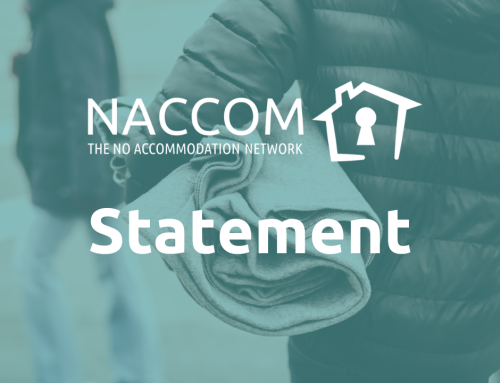Dave Smith, NACCOM’s National Coordinator, published the following blog this week through WriteYou:
Theresa May has set out her stall to end modern day slavery.
As Home Secretary she brought in the Modern Slavery Act, and as Prime Minister she is following that up with a government task force. Very few people will quibble with that. Slavery sucks, and we all know it. However, there is a significant chunk of people living in what amounts to slavery in the UK, whom Mrs. May does not want to set free, and whom, one could argue, she is responsible for enslaving. Let me explain.
The UK asylum system is an adversarial system: in that respect it is like the criminal justice system, with lawyers on both sides if a case comes to court. Unlike the criminal justice system, however, where innocence is assumed until proven otherwise, the person seeking asylum in the UK has to prove that he or she is a genuine refugee. If they cannot, their claim will be refused. A genuine refugee will by definition be fleeing persecution, and the persecutors are always corrupt people in power, whether that is a government, opposing tribe, business tycoon or bullying warlord. Those fleeing will often jettison any evidence that they have before fleeing the country, because, if caught with the incriminating documents, they will be imprisoned, tortured or even killed. A fake ID is usually essential in order to escape.
Trying to obtain evidence of persecution after having fled is notoriously difficult. Brutal regimes don’t give arrest warrants – they just detain, beat, rape and torture people with impunity. Only the physical scars remain, which the Home Office often argues could have been caused in some other way, even self-inflicted. Getting letters or emails attesting activity as a member of a banned organisation within the home country is almost impossible, as it would endanger friends and family, who are being watched by security forces. Getting similar documents from their organisation’s HQ in exile counts for little, as the Home Office usually considers them untrustworthy.
Consequently around two-thirds of initial UK asylum applications (35,000 last year) are refused. About a quarter of those refusals are overturned on appeal, which shows how wrong those initial decisions often are. Even those whose appeals are refused are often able to get refugee status here eventually, if they have the right support in obtaining that essential evidence. Put bluntly, most people seeking asylum in the UK are genuine refugees. Common sense will tell you that no one leaves their home country and spends thousands of to be brought in by an agent on a false passport, simply in order to get our wonderful benefits – certainly notasylum benefits, all £36.95 a week of them. That is especially true of those who had been well off and educated back home: statistics tell us that the average asylum seeker in the UK is more likely to be university educated than the average British citizen.
Of the roughly 50% of those whose claims are still refused even after appeal, how many are then actually deported? Despite the best efforts of successive home secretaries, including Mrs. May, not once in the past 20 years have we actually deported as many people as have been refused. Every year a couple of thousand newly refused asylum seekers are added to the pile of destitute people in the UK with no recourse to public funds (NRPF). That means no right to work, no right to benefits, and no right even to a room in a hostel.
Attempts to bribe refused asylum seekers with cash incentives to return home have failed spectacularly: after all, what’s the point of accepting two or three thousand pounds to return home through Assisted Voluntary Return (AVR), if you are going to end up in jail when you get there? After several years offering the ‘incentives’, and never getting more than 20% to take up the offer, usually after a period of destitution, the Home Office gave up. Now they have removed most of the unappealing carrot, and have started using the big stick – ‘Go Home’ vans, enforced destitution and indefinite detention. At any one time there are over a thousand refused asylum seekers languishing in so called ‘Immigration Removal Centres’. In effect these are prisons, because inmates cannot leave and are locked in a cell overnight. The only differences are that a prisoner in the criminal justice system has committed a crime, and has a release date: the only ‘crime’ that a refused asylum seeker has committed is being unwilling to go ‘home’, and there is no release date. They may be there for a few days or a few years. This mind-numbing uncertainty and deep sense of injustice often leads to severe depression, weight loss, deteriorating health and a disproportionate number of suicide attempts.
What happens to the tens of thousands of refused asylum seekers here with no recourse to public funds? How do they survive? Some – currently about 300 nationwide – are able to access accommodation and support through a NACCOM project. Others find friends they can stay with – often sleeping on a sofa or floor. Yet others end up being offered a bed in exchange for something – sometimes domestic work, sometimes sex. It may be an arrangement that is entered into willingly, but more often than not it is opportunistic exploitation of those who have very few options.
In addition there are the many thousands who are working illegally in the black economy, almost always for a pittance well below the minimum wage, often unpaid for weeks and even then at the whim of the ‘employer’. Next time you go to get your car washed, ask yourself why it’s so cheap. When you eat out in a restaurant, think about who might be washing up, hidden away in a back room, or who clears up at 2 in the morning. When you visit a company, wonder about who cleaned the loos that morning, or who was on security the night before. And when you drive through the red light district, consider the possibility that the girl or boy on the corner is there only because they have run out of all the other options I have just mentioned.
Home Office policy, which for six years was the responsibility of Theresa May, created the conditions under which asylum slavery flourishes in the UK. Whereas it is of course a good idea to target the traffickers who have brought victims to the UK for sex or work, it is utterly useless in tackling slavery caused by destitution through asylum policy. You can only do that by changing the policy, perhaps starting with an assumption of innocence rather than guilt. The bottom line is this. If Theresa May manages to eradicate modern day slavery – and I truly hope she does – she will have to include those refused asylum seekers whom she helped to enslave.




